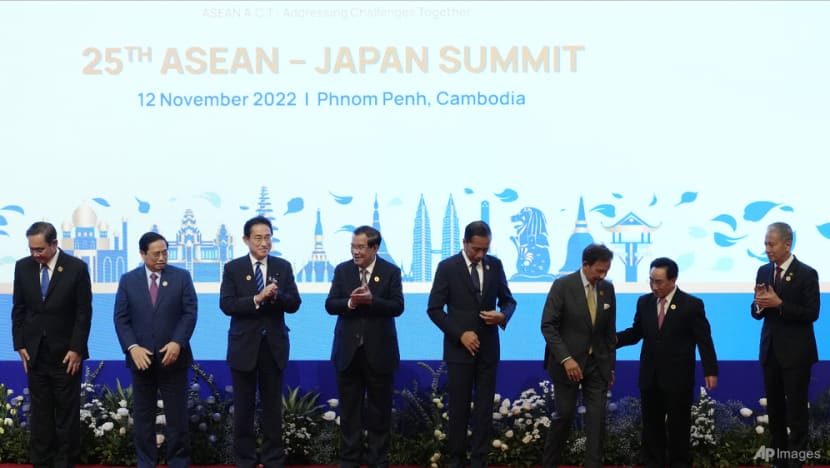Commentary: Why ASEAN appreciates Japan’s nuanced approach to regional order
Japan’s foreign policy stance strikes the right tone in a region on alert for potential big power rivalry to worsen, say Joanne Lin and William Choong from the ISEAS-Yusof Ishak Institute.

SINGAPORE: 2023 marks an important milestone in ASEAN-Japan relations with the celebration of the ASEAN-Japan golden jubilee (50th anniversary of informal dialogue relations from 1973, formalised in March 1977). The relationship is expected to be upgraded to a comprehensive strategic partnership, likely to be announced at the commemorative summit in Tokyo this December.
In 1977, Japanese premier Takeo Fukuda laid down the framework for Japan’s role in a post-World War II Asia - eschewing the trappings of military power that the region had witnessed on the war’s Asia-Pacific front and resolving to rebuild relations with Southeast Asia.
Today, the Fukuda Doctrine remains in force, but with some significant tweaks. Japan is a military power with self-imposed restrictions (such as a ban on nuclear weapons) but has significantly upgraded its military spending and capabilities and abided by key principles for a rules-based order.
Southeast Asian countries, which continue to grant Japan a major role in shaping the regional order with the Association of Southeast Asian Nations (ASEAN) amid growing geopolitical competition between China and the United States, are receptive to the Japanese stance.
JAPAN’S LEADERSHIP FAVOURABLY VIEWED IN SOUTHEAST ASIA
Japan’s ties with Southeast Asia are now strong and deep. In the ISEAS-Yusof Ishak Institute’s State of Southeast Asia 2023 Survey, Southeast Asia’s respondents that placed the most confidence in Japan’s leadership in maintaining the rules-based order and upholding international law increased from 7.7 per cent in 2022 to 8.6 per cent in 2023.
Overall, Japan remains the most trusted major power in the region. Among those who expressed confidence in Japan, the biggest group (41 per cent of respondents) viewed Japan as a responsible stakeholder while 26.4 per cent believed Japan had the economic resources and political will to provide global leadership.
The findings should not come as a surprise. First, Japan has been an all-weather friend to Southeast Asia in the past 50 years.
It is ASEAN’s third-largest trading partner while its official development assistance level is among the highest in the region. Japan was the first ASEAN dialogue partner to align its “free and open” Indo-Pacific (FOIP) vision with the ASEAN Outlook on the Indo-Pacific through a joint statement at 2020 ASEAN-Japan Summit.
SUPPORT FOR RULES-BASED ORDER
Second, Japan’s approach to Southeast Asia is a clever melding of hard power and the constructivist respect for principles to support a durable rules-based order. As David Arase argues, the late Japanese prime minister Shinzo Abe grasped that Japan’s security and prosperity rested not only on a strong US-Japan alliance but also on Japan’s role in a “well-functioning, free-trading rules-based order”.
In fact, in Japan’s FOIP strategy - with principles such as connectivity, adherence to international law, and freedom of navigation - lies a clever diplomatic framing. Such commonly accepted principles are palatable to ASEAN.
But the FOIP strategy is not as palatable to ASEAN when it is cast in a geopolitical frame to contain China or manage its rise (for example, touting freedom of navigation in the South China Sea).
On Mar 20 in his speech in India on Japan’s new plan for an FOIP, Prime Minister Fumio Kishida included “new pillars” such as rules for prosperity, connectivity, and enhancing air and sea security. However, Kishida’s “new” FOIP is merely window dressing for Abe’s foundational ideas about regional order.
While the US has not persuaded ASEAN member states to endorse its version of the FOIP, Japan has secured some rhetorical support from Indonesia, Thailand, and Vietnam. In this sense, Japan’s approach has gained more traction than the US’.
MORE NUANCED APPROACH TO CHINA
Third, Tokyo’s approach to China has been more nuanced than Washington’s. At the Shangri-La Dialogue in 2013, Shinzo Abe forcefully called for adherence to the “rule of law” in the region, particularly in the South China Sea, where China was at the time conducting an ambitious and controversial terra-forming enterprise.
Abe’s successors Yoshihide Suga and Kishida have maintained the same position, using identical language calling for the upholding of the “rule of law” amid attempts to “change the status quo by force or coercion”.
Still, Abe recognised the need to confront yet engage China. While he was against China’s Belt and Road Initiative, Abe forged 52 memoranda of understanding (MOUs) with Chinese President Xi Jinping in October 2018 to encourage bilateral cooperation in third-country markets, in fields such as transportation and energy.
Japan’s more nuanced approach is well received in Southeast Asia and by China.
Earlier this month, Foreign Minister Yoshimasa Hayashi was given the red carpet treatment in Beijing, meeting Premier Li Qiang, top diplomat Wang Yi and Foreign Minister Qin Gang. Departing from the American playbook, Hayashi pledged not to decouple from China, saying Tokyo would not accept a “de-Sinicisation” approach.
TAMPING DOWN GEOPOLITICAL TENSIONS
Separately, Southeast Asian countries appreciate Japan’s speaking truth to power when it comes to shared principles, particularly on pressing geopolitical questions such as Russia’s war against Ukraine and a potential conflict in Taiwan.
Kishida stressed that “Ukraine today could be East Asia tomorrow”. When Xi was visiting Moscow in March (and giving implicit support to Russia), Kishida chose that moment to announce a special global partnership between Japan and Ukraine - a clear indictment of Russia’s invasion.
Any potential conflict in the Taiwan Strait will hit closer to Southeast Asia than the Ukraine war. In such a scenario, Japan is expected to play a role given its ties to the US.
Significantly, the Japanese have decided to develop counter-strike capabilities, which will not only help deter Chinese attacks on the Japanese home islands but also dissuade China from invading Taiwan - a move that Southeast Asian countries should welcome. This is where Southeast Asia appreciates Japan’s contribution: The combination of hard and soft power, with a view towards tamping down tensions and closing off potential routes to escalation.
Joanne Lin is Co-coordinator of the ASEAN Studies Centre at ISEAS – Yusof Ishak Institute, and Lead Researcher (Political-Security) at the Centre. William Choong is Senior Fellow at the ISEAS – Yusof Ishak Institute and Managing Editor at Fulcrum. This commentary first appeared on the Institute's blog, Fulcrum.



















